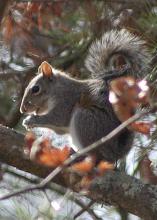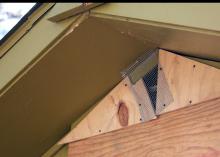Information Possibly Outdated
The information presented on this page was originally released on January 30, 2015. It may not be outdated, but please search our site for more current information. If you plan to quote or reference this information in a publication, please check with the Extension specialist or author before proceeding.
Keep squirrels out of the house year-round
STARKVILLE, Miss. -- Bare trees in the winter provide clear views of squirrels chasing each other up, down and every which way.
Mid-December through January is a common mating period for eastern gray squirrels, which explains the heightened activity. Baby squirrels are born about six weeks after mating occurs.
Typically, squirrels will build nests for these babies in the forks of tree branches or in the hollows of tree trunks. Their simple nests are fashioned mostly out of dry leaves and twigs.
In urban settings, however, squirrels occasionally become pests by nesting in attics or exterior walls of houses. Their activity in these spaces may cause structural or mechanical damage and cost homeowners significant time and money.
To enter a house, a squirrel sometimes travels along power lines and may short out transformers. Once inside a house, it may gnaw on wires and chew holes in pipes while gathering materials to build a nest.
At other times of the year, squirrels continue to be nuisances around the house. The eastern gray squirrel hoards food in several thousand caches per season. The process of burying or digging up and retrieving the contents of a cache may damage lawn areas or disrupt landscaped beds.
Squirrels may also chew bark or twigs on a homeowner’s prized ornamental shrubs. They will eat planted seeds, pick fruit off trees and nibble bites out of garden vegetables. More often than not, they will raid bird feeders before the birds ever have a chance to eat.
Both the eastern gray squirrel and eastern fox squirrel are game species in Mississippi. This means that Mississippi law does not allow landowners to trap these animals. However, squirrels can be hunted legally from October through February. Details on the 2014-2015 squirrel hunting seasons are available on the Mississippi Department of Wildlife, Fisheries, & Parks (MDWFP) website at http://mdwfp.com/wildlife-hunting.
For most Mississippi landowners, the first lines of defense to keep squirrels out of your house or stop them from destroying your landscape include exclusion and habitat modification.
Exclusion
- To deter squirrels from climbing power poles, place a 2-foot-wide metal collar around the pole 6 feet above the ground.
- Place 2-foot sections of lightweight plastic pipe around wires.
- Close up any openings to attics or buildings with heavy ½-inch wire mesh. Make sure there are no squirrels inside before doing this.
- As a last resort, wire mesh fences topped with electrified wires may keep squirrels out of your fruit and vegetable gardens.
Habitat Modification
- Keep tree limbs trimmed to at least 6 feet away from buildings to prevent squirrels from jumping onto roofs.
- Don’t plant trees within 8 to 10 feet of an exterior wall of a house or other structure.
- Install baffles above bird feeders, and grease poles to make climbing more difficult.
- Provide an alternative food source for squirrels, such as ears of corn. Hang or nail the ears on a tree or fence post as far away from bird feeders as possible.
If squirrels still cause problems after you take these precautions, consider hiring a commercial wildlife control operator to trap and remove the animals. Call the MDWFP office in Jackson for a list of approved operators around the state.

Editor’s Note: Extension Outdoors is a column authored by several different experts in the Mississippi State University Extension Service.






